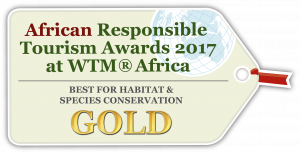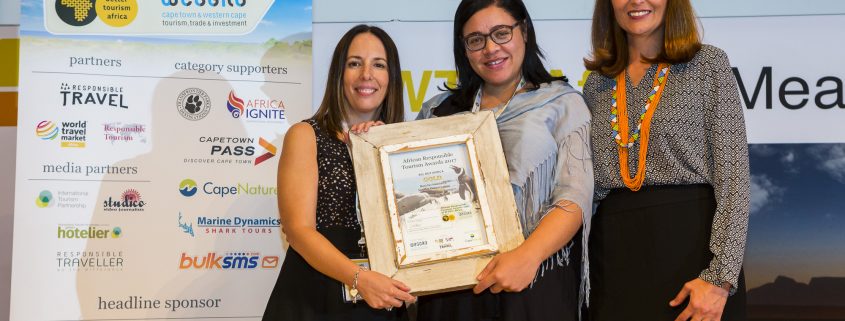All Out Africa wins a Gold Award for Best Species and Habitat Conservation at the African Responsible Travel Awards 2017
The African Responsible Tourism Awards exist to recognise organisations who are making significant contribution to responsible tourism, or as Harold Goodwin, Chair of the Judging Panel says the ambition is “to use tourism to make better places for people to live in. This also benefits the industry: great places to live are great places to visit.”
“The Gold and Silver Award winners should be particularly proud of what they have achieved; they have been recognised as being leaders in a Responsible Tourism movement where more is expected each year.”
Heidi van der Watt, managing director of Better Tourism Africa, pinpointed what makes the Award winners the leaders in responsible tourism in Africa:
“Our winners have a vision that extends beyond the commercial – linking business success with the wellbeing of local communities and the longevity of their environments. They want to make profits with principles, communicate balance sheets alongside beliefs, and won’t undermine passion in the pursuit of professionalism. They are resilient, determined, humanising advocates for their destinations. They are the future of tourism in Africa.”
All Out Africa are proud to have been selected for this award and want to thank all our partners over the years including universities (Swaziland, Florida, East Anglia, Louisiana, Auburn and Alberta) and also the sending organisations who facilitate placement of students and volunteers with us.

The Judges’ reasons for choosing All Out Africa as the Gold Winner were:
“With references from universities in Swaziland and Florida attesting to All Out Africa’s contribution to both research and education on habitats and species the judges were particularly impressed by All Out Africa’s social-entrepreneur approach to solving the problem of insufficient ecological information and capacity to enable successful conservation. Over the last 12 years All Out Africa has enabled 500 international volunteers to contribute meaningfully to conservation through data collection and supported and trained over 100 local students in field-based conservation and ecological research, With activities in Swaziland, Mozambique and South Africa they have supported the education of 15 local students at MSc level and more than 1000 undergraduate students from both local and international universities.”




Leave a Reply
Want to join the discussion?Feel free to contribute!